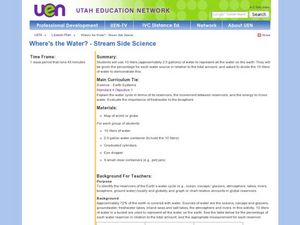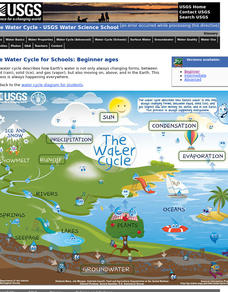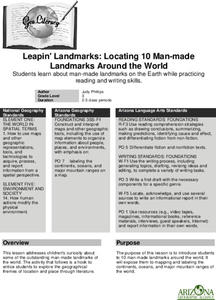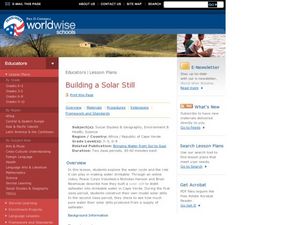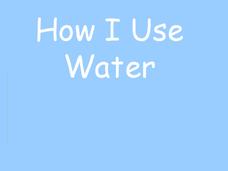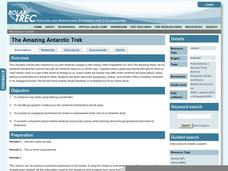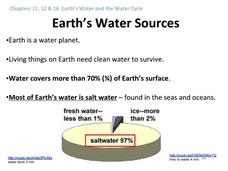Curated OER
Where's the Water? Stream Side Science
After a whole-class discussion of water reservoirs, ten liters of water are given to each lab group to represent Earth's total amount of water. They divide the water into smaller containers, each representing one of those reservoirs. The...
Poetry Class
Tackling Climate Change
Get your kids thinking about climate change with a series of activities that include creating a ditty box poem for the planet, a poem that identifies concepts or objects they would want to preserve.
US Geological Survey
The Water Cycle for Schools: Beginner Ages
Explore a day in the life of a water droplet. An interactive infographic helps scholars learn how water cycles work from precipitation all the way around to condensation. Learners hover over each step of the cycle to read more as they...
Curated OER
European Elevation Sort
Given a prepared database of European countries, sixth graders sort the countries in ascending order by elevation and identify the five countries with the highest elevations. This cross-curricular lesson combines elements of computer...
Curated OER
Properties of Fresh and Sea Water
Learners work with three stations to demonstrate the properties of water. They explore water's boiling point, freezing point, and its ability to store heat.
Curated OER
Liquid Rainbow
Students develop their own techniques for drawing a small sample of solutions into a straw. They hypothesize ways to increase the density of water, and discuss how salt-free rainwater tends to float on top of salty seawater.
Curated OER
Leapin' Landmarks: Locating 10 man-made landmarks around the world
Third graders engage in a lesson which addresses their curiosity about some of the outstanding people-made landmarks of the world. They explore the geographical themes of location and place through literature.
Curated OER
Lake Strata and Internal Waves
Use the classic density demonstration of placing a cola, a clear soda, and a diet soda into a tank of water. Then let learners attempt to pour some of the soda into layers in a clear container. The procedure explains a thermocline, and...
Curated OER
Dance: Water Dancing
Examine the way water moves, drips, and splashes with an expressive dance. Learners discuss the ways in which water moves, then create dance sequences that show or describe water. There are several suggestions to adapt this instructional...
Curated OER
Our Earth
For this Earth's environment worksheet, students complete a crossword puzzle given 35 clues about a variety of topics related to our Earth. Topics include ecosystems, precipitation, biomes, energy transfer, soil, weathering and rocks.
Curated OER
Building A Solar Still
Students investigate the water cycle by viewing an online video. In this drinking water activity, students create solar stills at their campus in order to purify water that is tainted. Students view a video on their computers...
Curated OER
Natural Disaster
Describe how plate tectonics account for various land formations. Learners discuss different marine sanctuaries and create a poster about tectonic activity in these areas. They share their posters with the class.
Curated OER
T3 Lesson Plan: Number 3
Sixth graders investigate local water. In this water cycle lesson plan, 6th graders take samples from surrounding water sources. Students record data from the samples, compare and graph the results.
Curated OER
How I Use Water
Beginning with a brief anticipatory set on how water is commonly used, this presentation evolves into a well planned lesson on the water cycle. Students will discuss vocabulary, label the parts of the water cycle, locate where water is...
Curated OER
Winter Wonderland - Winter Olympics and the Water Cycle
After a concise introduction to the water cycle, junior meteorologists access NOAA's average snowfall data. They choose a city to examine in terms of precipitation. Then they look at historical snowfall data and use it to predict snow...
K12 Reader
Water Water Everywhere
The protection of our water supply is the subject of an article used in this cross-curricular reading comprehension worksheet. After studying the passage, readers use information from the text to respond to a series of comprehension...
Curated OER
The Gender of Nouns
A great handout for middle-schoolers learning nouns and their genders, this resource is comprehensive and easy to read. Consider providing some practice opportunities for your learners while you review the information.
Polar Trec
The Amazing Antarctic Trek
This resource provides two ways to engage learners in using latitude, longitude, and research skills. In pairs, or on their own, learners will locate several Antarctic regions on a map. They will write the name of the place and a few key...
Carnegie Mellon University
Ocean Acidification
After brainstorming what they know about ocean acidification, youngsters place eggs in acid to determine the effects on calcium-containing organisms, and add carbon dioxide to solutions with sea shell material to discover the impact on...
Curated OER
Earth's Water Sources
General facts about Earth's water sources, human use, and the water cycle are outlined by this presentation. Slide three has a grammatical error and slide nine refers to the local watershed of the author, so you will need to make a few...
Information is Beautiful
How Many Gigatons of Carbon Dioxide...?
Here is an interesting infographic that presents information on the amount of carbon dioxide we can safely release into the atmosphere compared to the actual amount we have released to date.
K12 Reader
Churchill's Speech: We Shall Fight on the Beaches
Winston Churchill speech delivered to the House of Commons on June 4, 1940, is the focus of a comprehension exercise that asks readers to explain how the repetition in the speech supports the main purpose of Churchill's address.
San Francisco Public Utilities Commission
Let's Save Water: Water Conservation
Did you know that cutting down your shower by one minute a day can save five gallons of water? Learn about water conservation with a science reading activity. After kids finish reading key terms and water-saving tips in a reading...
Marine Institute
Water Pollution
Sixth graders investigate the various types of pollutants found in water and ways to help prevent water pollution. Through a hands-on experiment, learners create samples of polluted water by mixing water with vegetable oil, dirt,...
Other popular searches
- Continents and Oceans
- Continents Oceans
- Oceans and Seas
- Oceans of the World
- 7 Continents and Oceans
- Oceans and Climate
- Lesson Plans on Oceans
- Salty Oceans
- Salinity in the Oceans
- Lessons on Oceans
- Extent of Oceans
- Oceans and Climate Change


